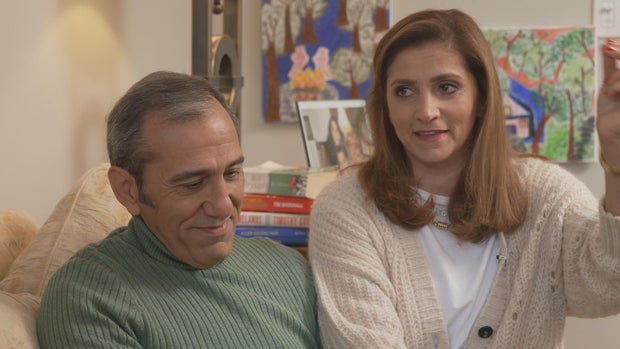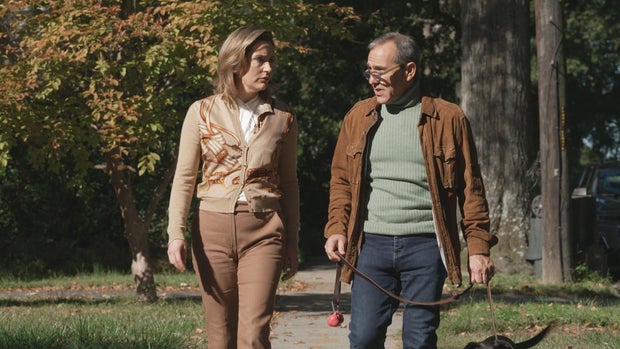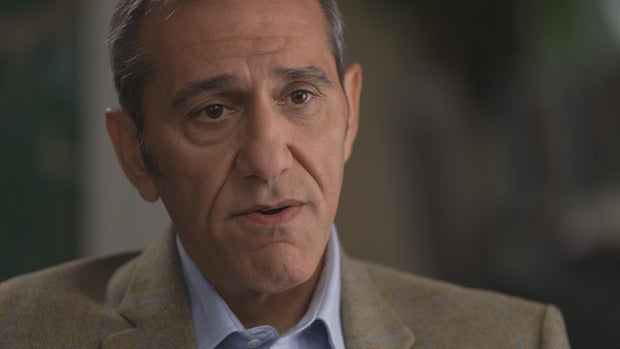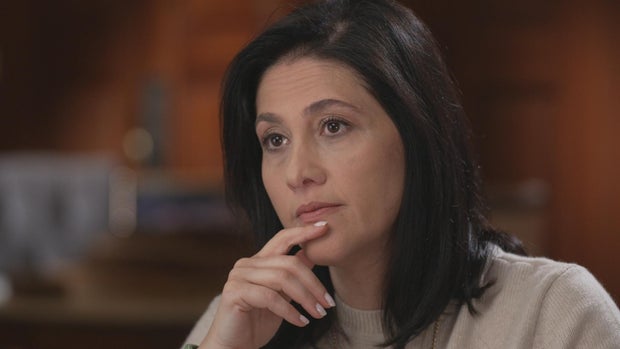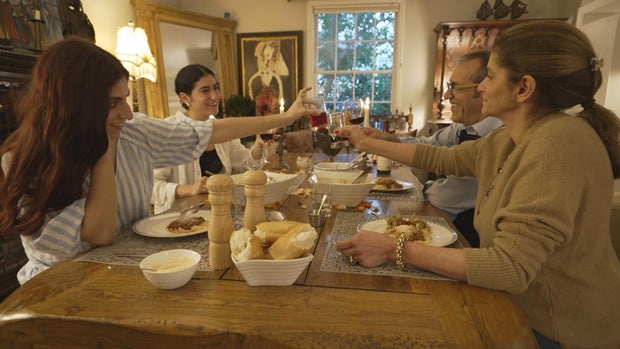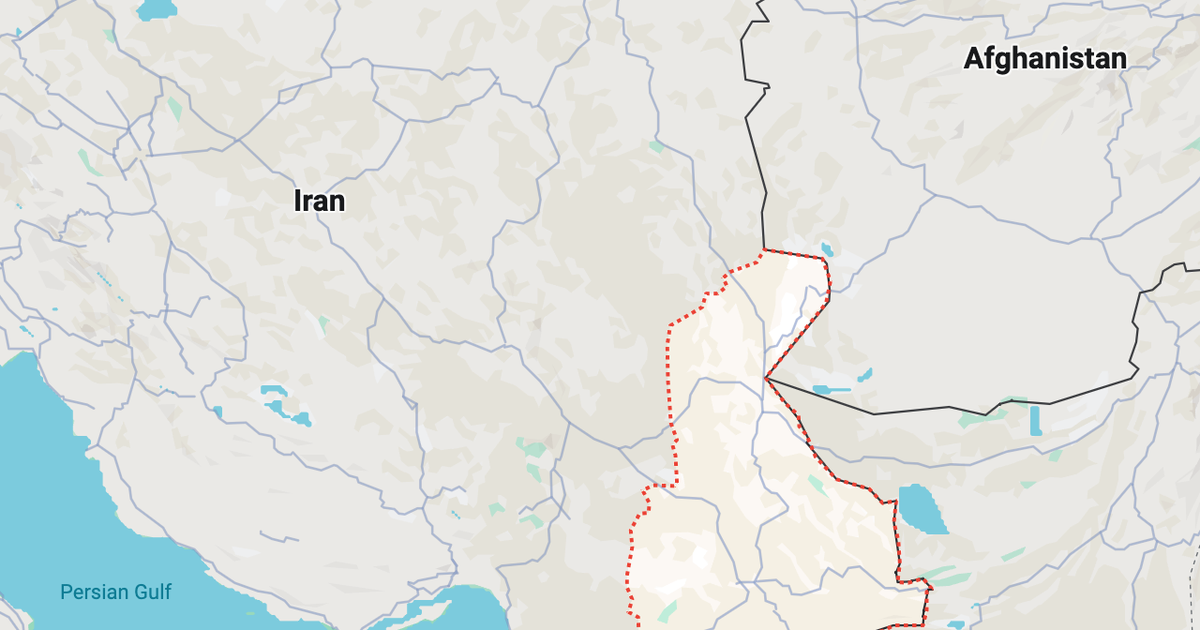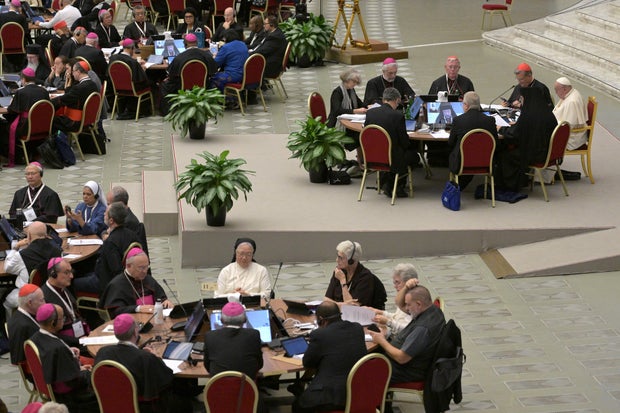CBS News
Emad Shargi, American freed in Iran prisoner deal, tells harrowing story for the first time | 60 Minutes

This is an updated version of a story first published on Oct. 22, 2023. The original video can be viewed here.
For more than five years – 1,975 days – American businessman Emad Shargi was a prisoner of the Islamic Republic of Iran. He spent much of that time in a notorious prison run by Iran’s Revolutionary Guard. In September, Shargi and four other Americans were freed in a complicated deal involving $6 billion in restricted Iranian oil revenue. As we first reported last fall, the deal drew criticism for granting financial relief to a regime that the U.S. government considers the world’s largest state sponsor of terrorism. It drew even more scrutiny after Hamas, which is financially supported by Iran, attacked Israel on Oct. 7. It is a tense moment in the region—and the death of Iran’s president has added uncertainty about its political leadership. With more than 120 hostages still unaccounted for in Gaza – including five U.S. citizens, and dozens of other Americans the U.S. says are held without cause around the world, Shargi’s story is a stark illustration of the difficulties involved in bringing Americans home.
Emad Shargi: This story– should’ve never happened. But I didn’t waste five and a half years, Margaret. I learned a lot about myself, about humanity, about what is important in life. Being thrown in a cell, it’s the closest you come to death.
Emad Shargi is a dual citizen of the U.S. and Iran. He left Iran at age 13, before the 1979 Islamic Revolution. In the U.S. he went to college, met his wife Bahareh, and started a business representing U.S. chemical companies in the Middle East….and later worked for a private equity firm in Abu Dhabi. By 2016, with their daughters off to college, Emad and Bahareh, who is also Iranian-American, decided to travel to Iran and rediscover their roots…
Iran had just agreed to a landmark deal to limit its nuclear development in exchange for sanctions relief, which made Shargi think the country was full of opportunity. His father thought otherwise.
60 Minutes
Emad Shargi: He said to me, he said, “Emad, you don’t know this country. People like you with dual nationalities, they pick these people up once in a while for whatever use they have for them.” And I said, “Dad, give me a break, you know. I’ve never been in the U.S. government. Nothing.” And I guess if anybody asks me, “In one sentence, what have you learned from this experience,” I would say, “Listen to your dad.”
The couple, both in their 50s, began spending time in Iran. Shargi found work consulting for an Amsterdam-based company investing in Iranian businesses.
Margaret Brennan: Was there anything that suggested to you that you were a target, that there was going to be a problem?
Emad Shargi: You know, I thought, “I have a better chance of getting hit crossing the road by a motorbike,” when I was there. I did not see this coming.
Just past midnight, on April 23, 2018, about 15 armed agents showed up at the family house in Tehran.
Emad Shargi: Gentleman walked in he said, “This is an arrest warrant for you and for your wife.”
Margaret Brennan: On what grounds?
Emad Shargi: He wouldn’t tell me at the time. Around 2:30 in the morning they said, “OK. Get ready. We are taking you.” And my wife said, “No, you can’t take him,” and they told her to sit down and mind her business, that they’ll get to her later.
Margaret Brennan: What did that mean?
Emad Shargi: I did not know at the time. So when they took me out of that house I did not know what was going to happen to my wife.
Margaret Brennan: That’s terrifying.
Emad Shargi: Yep. It’s not a position you want to be in.
60 Minutes
He was taken to a place in Tehran Iranians have long feared – Evin Prison…to a special ward known as 2A, run by the intelligence division of the Islamic Revolutionary Guard Corps.
Emad Shargi: They took me to a room. They told me to strip naked. They gave me some blue garbs. They told me, “This is the end of the line for you, and most likely you’ll never see the outside world.” “From now on nobody will address you by your name. You are a code now,” 97-0-10 was my code.
Margaret Brennan: That’s dehumanizing.
Emad Shargi: Ah, they were experts at that. And then hell starts.
Margaret Brennan: Torture.
Emad Shargi: Threats of torture and psychological torture. They take you to a very small room. And then they throw a giant of a human being in there, who proceeds to hit you, to push you around, to threaten to kill you. And then the good cop comes in, and he says, “Look, I can put a stop to this. You just need to confess.”
Margaret Brennan: Confess to what?
Emad Shargi: They said, “You have to confess that you are a spy,” which is ludicrous.
Shargi says his interrogators threatened him with electrical shocks, water-boarding, and hanging, but never followed through.
Emad Shargi: So I realized they don’t want to damage their product at that point.
Margaret Brennan: Product.
Emad Shargi: Correct.
Margaret Brennan: Why do you choose that word?
Emad Shargi: Because that’s what I was.
Margaret Brennan: You believe you were taken simply because you were American to extract a price.
Emad Shargi: Correct.
He told us some interrogations went on for nine hours a day.
Margaret Brennan: What did you tell them during all those hours of questioning?
Emad Shargi: I mean, the most mundane things. The first day they kept asking me, “Why did you go to the White House church?” And I’m just thinking to myself, going, “I know the White House doesn’t have a church.” And then it clicked. They had hacked my Facebook. They had seen the pictures of us attending my daughter’s events at school at the National Cathedral. They had no idea the National Cathedral had nothing to do wa– with the White House.
Margaret Brennan: This is an intelligence service.
Emad Shargi: You would be surprised. They had my telephone so they had gone through the list of every person I’d ever met during the last 30 years of my business career. “Who are these? Who are those?” These questions would go on day after day after day.
In December 2018, after eight months of interrogation, Emad Shargi was suddenly released on bail. His wife Bahareh, who’d never been arrested, was able to leave the country. Emad expected to join her soon; he says he received a letter of exoneration. But he wasn’t allowed to leave Iran.
Emad Shargi: Now my story takes a bizarre turn. My file had been sent to the Revolutionary Court. It’s where a gentleman by the name of Judge Salavati sits, also known as the hanging judge.
In November 2020, the hanging judge sentenced Shargi to 10 years in prison under a broadly-worded statute which prohibits cooperating “by any means” with foreign states against Iran. Before Shargi had to report back to prison, a friend came up with a plan.
Margaret Brennan: To escape.
Emad Shargi: To escape. And I said, “Let’s go.”
Smugglers helped him make his way to Iran’s mountainous border with Kurdistan. But about 30 miles from freedom…
Emad Shargi: I look up. And there is about 15 guys with AK-47 pointing at the car.. They threw me on the ground. And their team leader came. He opened the scarf that I– they had put around my eyes. And he looked away and he shook his head to his team members.
Margaret Brennan: They were looking for somebody else–
Emad Shargi: They were looking for somebody. But now we have round two of incarceration
This Iranian propaganda photo taken in January 2021 shows him bearded and shackled, being escorted back to ward 2a…where he says he underwent another eight months of interrogation.
Emad Shargi: This second eight months, I was interrogated close to 400 hours.
Margaret Brennan: How do you stay sane?
60 Minutes
Emad Shargi: All of those times, there was never a doubt in my mind that my government would get me out. That was my hope.
Back in Washington, Bahareh and her daughters campaigned for Emad’s release…
….and sought help from the State Department, which reviewed Shargi’s case and determined he was wrongfully detained.
The Biden administration had been trying to broker both the release of American detainees and the renewal of the Iran Nuclear Deal, which the Trump administration had pulled out of.
But the talks stalled.
In the fall of 2022, widespread protests broke out following the death of a young woman in the custody of Iran’s morality police.
In Evin Prison, the inmates rioted and set fires…the guards responded with tear gas and bullets.
Emad Shargi: It was happening a couple of yards from where I was sitting in– in my room. Now, if I left, I could be shot. If I stayed, I could suffocate.
With no good option, he stayed in his cell. Shargi says he was rescued, ironically, by his tormentors – a team of Revolutionary guards.
Emad Shargi: They were pale white when they saw me. They were like, “Emad, let’s get the hell out of here.”
Margaret Brennan: Because you’re worth more alive than you are dead.
Emad Shargi: Correct
Shortly after the fire, Emad’s sister Neda sought a meeting with Iran’s top diplomat at the United Nations, Amir Saeid Iravani. She wanted to learn what was holding up a prisoner deal.
60 Minutes
Margaret Brennan: He acknowledged to you that there are people inside his own government that didn’t want the deal to happen.
Neda Sharghi: Yeah. I mean, he acknowledged that. Just as there are people in our government who didn’t want this to happen. You know, we’re dealing with innocent human lives, and we want to rectify the situation. But for other people, it’s politics and it’s power. And they get in the way.
Arranging a meeting with President Biden proved more difficult for Neda. Determined to help her brother, she went to this crowded White House reception for the Persian New Year, and managed to button-hole the president after he spoke….
Neda Sharghi: I told him they are American citizens who are innocent and need to come home as soon as possible, because time is not on our side.
After roughly two years of start and stop negotiations, the U.S. and Iran reached a complex agreement.
Six billion dollars that Iran had earned from selling its oil had been tied up in a foreign account for years due to U.S. sanctions. According to U.S. officials, Iran can use the money to buy humanitarian goods like food and medicine once the U.S. approves the transactions. The money goes to the suppliers, not the government of Iran.
On September 18th, President Biden granted clemency to five Iranians accused of non-violent crimes. Five Americans, including Emad Shargi, were released and flown to Qatar.
From there, they flew to a military base in Virginia…. where their families were waiting…
60 Minutes
Emad Shargi: I hadn’t seen my daughters for five and a half, six years. I had missed all their graduations, birthdays, anniversaries with my wife. It’s like being born again. We had thought we were going to be freed so many times, and this was it.
Since his release, Emad’s making up for lost time with his family…he’s also had time to reflect.
Emad Shargi: You think to yourself, “What was this all about?” “Why did– did they do this to me and to my family?”
Margaret Brennan: For five years.
Emad Shargi: And the short answer is– hostage-taking as statecraft
Margaret Brennan: If you are an American–
Emad Shargi: Yes.
Margaret Brennan: An Iranian American–
Emad Shargi: No. Iranian American, Italian American, American, do not go to Iran.
Less than three weeks after Shargi’s release, Hamas – which is financially backed by Iran – attacked Israel. As Israel counter-attacked in Gaza, some U.S. lawmakers have called for blocking Iran’s access to the $6 billion. The White House insists no money has been released so far and sources told us the arrangement has not changed.
Margaret Brennan: When you watch the news right now and you see what has happened in Israel– not just about the people killed, but the hostages that have been taken, what is that like for you?
Emad Shargi: I cannot imagine what it must feel like to have your daughter, your son, your wife, your father being taken hostage. And I cannot believe what’s the families are going through. I just wish them a safe return home.
Produced by Andy Court. Associate producer, Annabelle Hanflig. Broadcast associates, Eliza Costas and Sophia Barkoff. Edited by Warren Lustig.
CBS News
Navy issues apology for destroying Alaska Native village in 1882
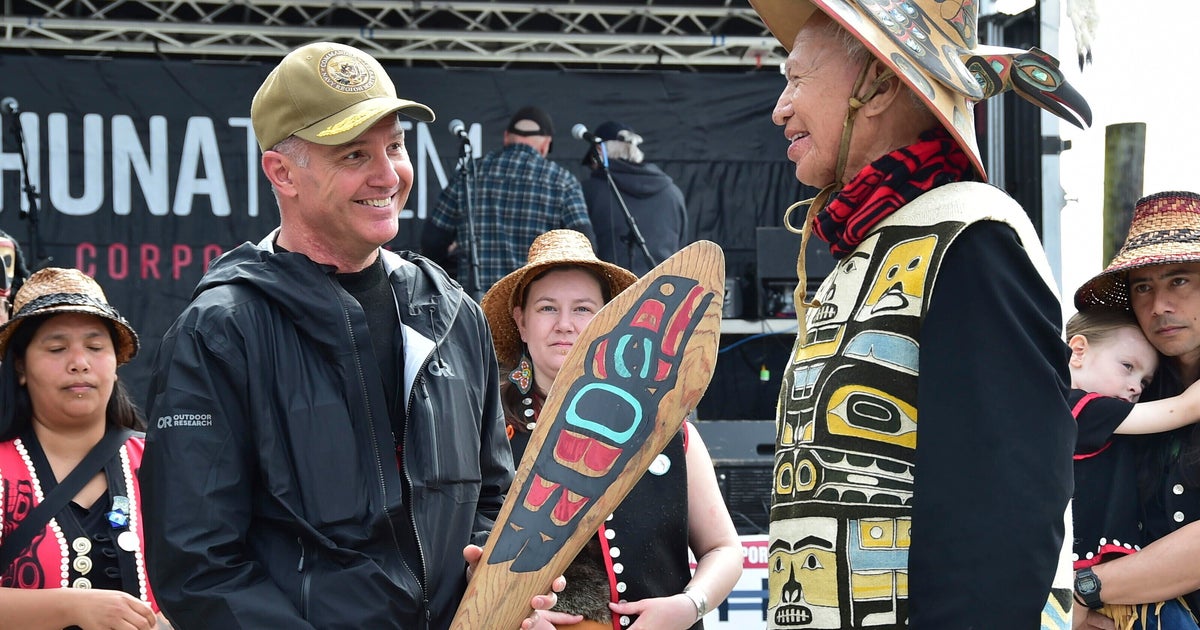
Shells fell on the Alaska Native village as winter approached, and then sailors landed and burned what was left of homes, food caches and canoes. Conditions grew so dire in the following months that elders sacrificed their own lives to spare food for surviving children.
It was Oct. 26, 1882, in Angoon, a Tlingit village of about 420 people in the southeastern Alaska panhandle. Now, 142 years later, the perpetrator of the bombardment — the U.S. Navy —has apologized.
Rear Adm. Mark Sucato, the commander of the Navy’s northwest region, issued the apology during an at-times emotional ceremony Saturday, the anniversary of the atrocity.
“The Navy recognizes the pain and suffering inflicted upon the Tlingit people, and we acknowledge these wrongful actions resulted in the loss of life, the loss of resources, the loss of culture, and created and inflicted intergenerational trauma on these clans,” he said during the ceremony, which was livestreamed from Angoon. “The Navy takes the significance of this action very, very seriously and knows an apology is long overdue.”
While the rebuilt Angoon received $90,000 in a settlement with the Department of Interior in 1973, village leaders have for decades sought an apology as well, beginning each yearly remembrance by asking three times, “Is there anyone here from the Navy to apologize?”
“You can imagine the generations of people that have died since 1882 that have wondered what had happened, why it happened, and wanted an apology of some sort, because in our minds, we didn’t do anything wrong,” said Daniel Johnson Jr., a tribal head in Angoon.
The attack was one of a series of conflicts between the American military and Alaska Natives in the years after the U.S. bought the territory from Russia in 1867. The U.S. Navy issued an apology last month for destroying the nearby village of Kake in 1869, and the Army has indicated that it plans to apologize for shelling Wrangell, also in southeast Alaska, that year, though no date has been set.
Chief Mass Communication Spc. Gretchen Albrecht/U.S. Navy via AP
The Navy acknowledges the actions it undertook or ordered in Angoon and Kake caused deaths, a loss of resources and multigenerational trauma, Navy civilian spokesperson Julianne Leinenveber said in an email prior to the event.
“An apology is not only warranted, but long overdue,” she said.
Today, Angoon remains a quaint village of about 420 people, with colorful old homes and totem poles clustered on the west side of Admiralty Island, accessible by ferry or float plane, in the Tongass National Forest, the nation’s largest. The residents are vastly outnumbered by brown bears, and the village in recent years has strived to foster its ecotourism industry. Bald eagles and humpback whales abound, and the salmon and halibut fishing is excellent.
Accounts vary as to what prompted its destruction, but they generally begin with the accidental death of a Tlingit shaman, Tith Klane. Klane was killed when a harpoon gun exploded on a whaling ship owned by his employer, the North West Trading Co.
The Navy’s version says tribal members forced the vessel to shore, possibly took hostages and, in accordance with their customs, demanded 200 blankets in compensation.
The company declined to provide the blankets and ordered the Tlingits to return to work. Instead, in sorrow, they painted their faces with coal tar and tallow — something the company’s employees took as a precursor to an insurrection. The company’s superintendent then sought help from Naval Cmdr. E.C. Merriman, the top U.S. official in Alaska, saying a Tlingit uprising threatened the lives and property of White residents.
The Tlingit version contends the boat’s crew, which included Tlingit members, likely remained with the vessel out of respect, planning to attend the funeral, and that no hostages were taken. Johnson said the tribe never would have demanded compensation so soon after the death.
Merriman arrived on Oct. 25 and insisted the tribe provide 400 blankets by noon the next day as punishment for disobedience. When the Tlingits turned over just 81, Merriman attacked, destroying 12 clan houses, smaller homes, canoes and the village’s food stores.
Six children died in the attack, and “there’s untold numbers of elderly and infants who died that winter of both cold, exposure and hunger,” Johnson said.
Billy Jones, Tith Klane’s nephew, was 13 when Angoon was destroyed. Around 1950, he recorded two interviews, and his account was later included in a booklet prepared for the 100th anniversary of the bombing in 1982.
“They left us homeless on the beach,” Jones said.
Rosita Worl, the president of Sealaska Heritage Institute in Juneau, described how some elders that winter “walked into the forest” — meaning they died, sacrificing themselves so the younger people would have more food.
Even though the Navy’s written history conflicts with the Tlingit oral tradition, the Navy defers to the tribe’s account “out of respect for the long-lasting impacts these tragic incidents had on the affected clans,” said Leinenveber, the Navy spokesperson.
Tlingit leaders were so stunned when Navy officials told them, during a Zoom call in May, that the apology would finally be forthcoming that no one spoke for five minutes, Johnson said.
Eunice James, of Juneau, a descendant of Tith Klane, said she hopes the apology helps her family and the entire community heal. She expects his presence at the ceremony.
“Not only his spirit will be there, but the spirit of many of our ancestors, because we’ve lost so many,” she said.
CBS News
Pope Francis’ Catholic church reform process ends without giving more equity to women
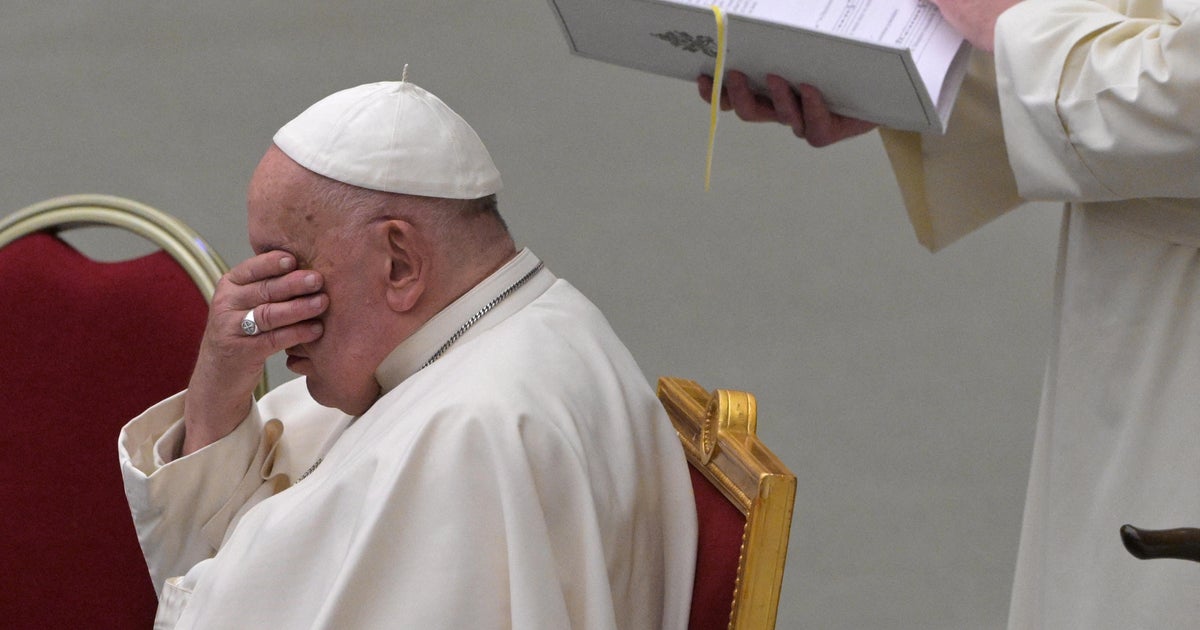
Pope Francis’ yearslong process to reform the Catholic Church closed Saturday with recommendations that fell short of giving women more equity as hoped but reflected the pope’s aims for a church that at least listens more to its followers.
In a significant move, the pope said he would not issue a teaching document from the recommendations, which called for women to be allowed all opportunities that Church law already provides while leaving open the contentious question of allowing women to be ordained as deacons.
As a result, it remains unclear what if any authority or impact the synod’s final recommendations will have, given the purpose of the exercise was to provide the pope with specific proposals on reform.
“In this time of war, we must be witnesses to peace” and give an example of living with differences, the pope said in explaining his decision.
TIZIANA FABI/AFP via Getty Images
Francis said he would continue to listen to the bishops’ counsel, adding “this is not a classic way of endlessly delaying decisions.”
Deacons perform many of the same functions as priests, such as presiding over baptisms, weddings and funerals, but they cannot celebrate Mass. Advocates say allowing women to be deacons would help offset the shortage of priests. Opponents say it would signal the start of a slippery slope toward ordaining women to the all-male priesthood that Francis has repeatedly reaffirmed.
Earlier this week, the Vatican’s top doctrinal officer, Cardinal Victor Manuel Fernandez, told the extraordinary assembly of 368 bishops and laypeople that Francis had said the moment “is not ripe” for allowing the ordination of women as deacons. He did not respond directly to a request to define what would determine “ripeness” for a greater role for women.
The multi-year synod process had sparked great hopes for change, especially for women, who have long complained that they are treated as second-class citizens in the church. Women are barred from the church’s highest ministerial positions, yet do the lion’s share of the work running Catholic hospitals and schools and passing the faith onto future generations.
Speaking to the synod on Thursday, Fernandez explained that a special working group would continue beyond the closing of the meeting, but that its focus would be on discussing the role of women in the church — not in the diaconate, or the office of deacon. He added that while working with women in previous pastoral roles, “most did not ask for or want the diaconate, which would be cumbersome for their lay work.”
The meeting asked for “full implementation of all the opportunities already provided for in Canon Law with regard to the role of women, particularly in those places where they remain under-explored.” It leaves open “the question of women’s access to diaconal ministry.”
TIZIANA FABI/AFP via Getty Images
It was the most contested paragraph of the final document, with 258 votes for and 97 against. It was not clear if the “no” votes were because the language went too far or not far enough.
The outcome is a disappointment for Catholics who have been campaigning for recognition that women share a spiritual calling that is no different than a man’s. They also noted that despite the inclusion of women in the synodal process, the working group that is guiding discussions on women’s role is being run by the Roman curia, operating outside the synod.
“I think the final document will be received with much disappointment and frustration by many women around the world who are hoping for concrete changes,” said Kate McElwee, the executive director of the Women’s Ordination Conference.
While she acknowledged a “cultural shift,” she said “the pace of that shift is perhaps too slow for many women.”
The first phase of the synod process ended last year by concluding it was “urgent” to guarantee fuller participation by women in church governance positions, and calling for theological and pastoral research to continue about allowing women to be deacons.
If before the synod the idea of allowing women to be deacons was a fringe proposal pushed by Western progressives, the idea gained attention during the debate. It became something of a litmus test of how far the church was going to go, or not, to address demands of women for greater equality and representation in the church’s highest ranks.
Francis, had other ideas, insisting that ordaining women would just “clericalize” them and that there were plenty of other ways to empower women in the church, even leading Catholic communities, without resorting to ordination.
CBS News
Jim Donovan, Cleveland Browns play-by-play announcer and TV sports anchor, dies of cancer at 68

Jim Donovan, the beloved radio play-by-play announcer for the Cleveland Browns and a TV sports fixture for more than four decades, died Saturday. He was 68.
Donovan retired from his broadcast career earlier this year and stepped away from his game-day duties with the team before this season while battling cancer. Donovan announced his retirement from WKYC on May 30 and worked his final broadcast as a sports anchor on June 10. He had called Cleveland’s games since the team’s expansion rebirth in 1999.
David Richard / AP
“This is an incredibly difficult day for us and the entire Cleveland Browns organization,” Browns owners Dee and Jimmy Haslam said in a statement. “His impact as the Voice of the Browns for 25 years is immeasurable as he touched the lives of our fans each and every Sunday with his love for the Browns and his brilliance at his craft.
“He will be greatly missed, but he cemented a legacy that will live on forever. The only thing that outweighed his love for this city and this team was the love he had for his family. Our thoughts and prayers are with his wife, Cheryl, his daughter, Meghan, and everyone who was fortunate enough to call Jimmy family or friend.”
A Boston native known to everyone as “Jimmy,” Donovan endeared himself to Cleveland fans with his passion, sense of humor and professionalism. He was a stickler for detail, spending countless hours preparing for game broadcasts.
Donovan had recently been inducted into the Browns’ Legends Club and the Greater Cleveland Sports Hall of Fame. He had been too ill to attend the events.
When he was forced to step down in August, Donovan wrote a letter to Browns fans expressing his gratitude for their support.
“I have called Browns games for 25 years. Not a day has gone by when I haven’t paused and been so proud to be ‘The Voice of the Browns,'” he wrote. “Cheryl, Meghan and I thank you for all the love, support and prayers during my rough patches. It’s like having a huge family around us. And that’s what makes the Cleveland Browns so special. You do.”
Donovan had to step away as sports director at WKYC-TV last fall for several months to undergo treatment for leukemia. He returned to the broadcast booth in time to call the team’s late-season run to the playoffs.
Donovan was first diagnosed with chronic lymphocytic leukemia, a strain of the disease that starts in white blood cells and affects bone marrow, in 2000. He underwent a bone marrow surgery in 2011.
A graduate of Boston University, Donovan got to Cleveland in 1985. Along with doing local reporting of the city’s three professional sports franchises, Donovan also had several national network assignments and was part of NBC’s coverage team at the 1992 and 1996 Summer Olympics.


